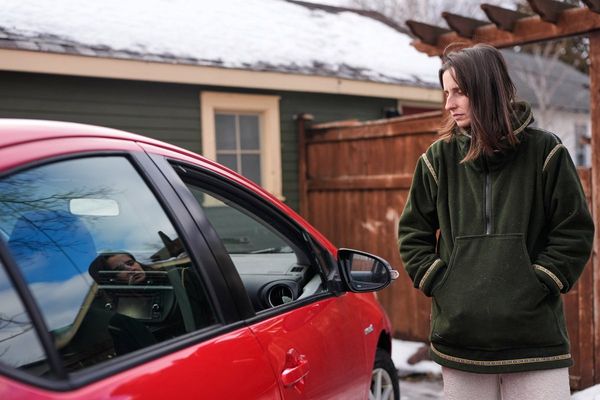
The veteran film-maker Ken Loach is famous for storylines that depict life’s bleakest injustices. But his latest film has touched a political nerve that is more raw now than when it was conceived before the pandemic.
Loach, now 87, has said that The Old Oak, which opened in cinemas on Friday, will be his last in a career spanning more than six decades. The six-week shoot was challenging, he says, but plays down the difficulties of making a big film at his age with the sight in one eye almost gone.
“When you’re doing it, you’re doing it, you just have to get a move on and get on with it,” he says. “But I can’t see me getting round the course again. Your capacity fades a bit when you’re knocking on.”
One of the main characters in the film, set in a rundown former mining village in the north-east, is a pub whose name gives the film its title. It’s the last remaining space in the once thriving community that has fallen on hard times after three decades of decline. It becomes a focal point for the film.

Tensions rise in the village when Syrian families are bussed into the area as part of a refugee resettlement programme with little or no prior warning given to the residents. The new arrivals get a hostile reception from some – but not all – of the village’s white working-class inhabitants, who question why the Syrians are being given houses when they themselves have so little.
With his longtime screenplay writer partner, Paul Laverty, Loach planned the film in 2019, using as material the arrival of Syrian refugees to the UK in 2016 as part of a government programme to resettle 20,000 people. Then the pandemic struck, the project was put on hold and neither of them knew whether the film would ever see the light of day.
Since Loach and Laverty began work on the film, the far right has mobilised against asylum seekers in a way that was not the case in 2019. Then, almost no asylum seekers were accommodated in hotels and government plans to house them in spartan military bases such as RAF Scampton in Lincolnshire and Wethersfield airfield in Essex along with the Bibby Stockholm barge in Portland, had not been conceived. These sites are now flashpoints for the far right.

The film explores how one traumatised community reacts to another when they end up living side by side and how relationships develop between the refugees and the longstanding residents in the village.
Laverty says the film shows not only the despair of people’s lives but hope, too. “Hope is multi-faceted. It’s empathy. One thing the two communities in this film didn’t expect was to build hope. History is full of cruelty but there are also moments of empathy and understanding.”
He cites one character, a village resident who is a “good person” but who starts to swallow anti-migrant rhetoric. “If we don’t start listening to people in communities the greater danger is that the far right will move in,” he says.
Loach, a lifelong socialist with steadfast political convictions, says: “The far right is on the march across Europe. I believe that home secretary Suella Braverman is cynical. She knows exactly what she’s unleashing with her comments.”

Although Loach has said this is his final film, his love for his work is undiminished. His 1969 classic film Kes, about a troubled boy and his relationship with a kestrel, was voted one of the best films of the 20th century by the British Film Institute.
“I don’t think a film like Kes would get made today,” he says. “Everything is micromanaged these days. I’m not much of a cinemagoer but the use of the camera is much more aggressive now. My influences which have stayed with me are the politics of the 1960s and the new left and some of the postwar European films.”
Even with his failing eyesight, and his statement that this is his final film, is it possible that this won’t be the last work from Loach? “Never say never,” he laughs. “You only need one eye to look through a camera.”







